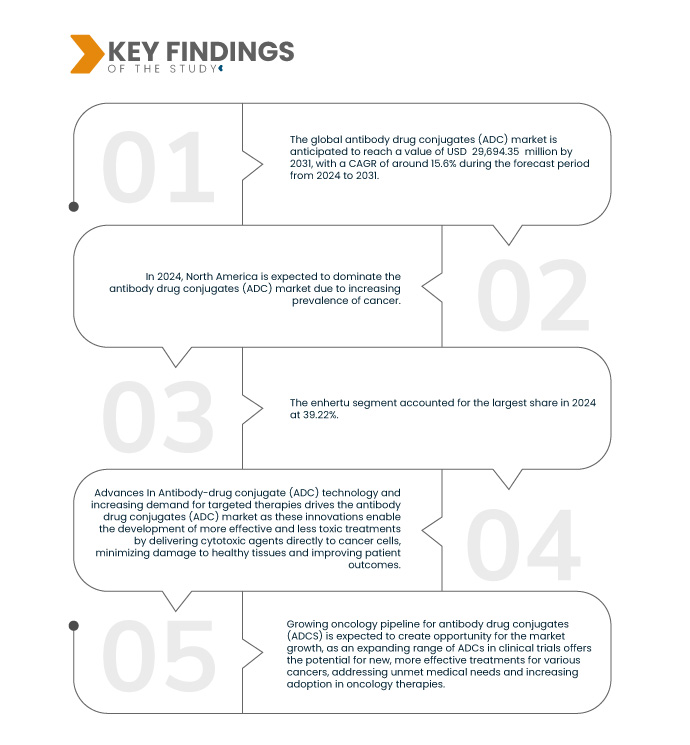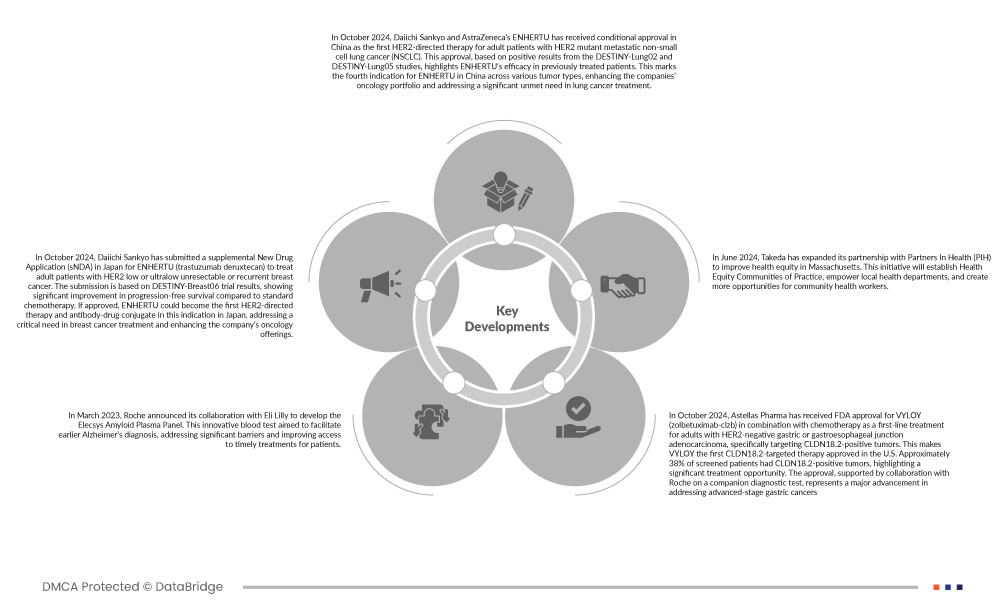암 유병률 증가는 전 세계 항체-약물 접합체(ADC) 시장을 크게 성장시키며, 효과적인 표적 치료에 대한 수요를 증가시키고 있습니다. ADC는 단일클론 항체와 강력한 세포독성 약물을 결합하여 건강한 조직에 대한 손상을 줄이면서 정밀한 암세포 표적 치료를 제공합니다. 암 발병률이 증가함에 따라, 제약 회사들은 특히 까다로운 암 유형에 대한 더욱 개인화된 치료 수요를 충족하기 위해 ADC 기술에 막대한 투자를 하고 있습니다. 이러한 암 환자 증가는 ADC 임상 시험, 규제 승인, 그리고 시판 허가를 가속화하여 ADC 시장을 더욱 발전시키고 있습니다. 암 유병률 증가는 효과적인 표적 치료에 대한 수요를 증가시켜 전 세계 ADC 시장을 크게 성장시키고 있습니다. 건강한 조직은 손상시키지 않으면서 강력한 치료제를 암세포에 직접 전달할 수 있는 ADC는 유망한 솔루션으로 주목을 받고 있습니다. 이러한 암 관련 부담 증가는 ADC 기술에 대한 연구, 개발 및 투자를 촉진하여 새로운 발전을 촉진하고 시장을 확대하고 있습니다.
전체 보고서는 https://www.databridgemarketresearch.com/reports/global-antibody-drug-conjugates-market 에서 확인하세요.
Data Bridge Market Research에 따르면 글로벌 항체 약물 접합체(ADC) 시장 규모는 2023년에 93억 3천만 달러로 평가되었으며, 2031년까지 296억 9천만 달러에 이를 것으로 예상됩니다. 2024년부터 2031년까지의 예측 기간 동안 CAGR은 15.6%입니다.
연구의 주요 결과
항체-약물 접합체(ADC) 기술의 발전
항체-약물 접합체(ADC) 기술의 발전은 암 치료의 치료 효과와 안전성을 모두 향상시킴으로써 글로벌 ADC 시장의 성장을 견인하고 있습니다. 주요 혁신 기술로는 건강한 조직은 손상시키지 않으면서 암세포를 표적으로 하는 안정적이고 정밀한 약물 전달을 위한 링커 개선이 있습니다. 최적화된 페이로드와 바이오마커 기반 환자 선별 기능을 갖춘 차세대 ADC는 부작용을 최소화하면서 가장 큰 효과를 볼 수 있는 환자에게 치료제가 도달할 수 있도록 보장합니다. 또한, 제조 공정 개선을 통해 생산 비용이 절감되고 접근성이 향상되며 ADC 개발에 대한 투자가 확대되고 있으며, 이는 모두 탄탄한 파이프라인 구축과 시장 관심 확대에 기여하고 있습니다.
향상된 링커 시스템 및 효과적인 약물 탑재량과 같은 혁신은 암 치료의 정밀성과 안전성을 향상시킵니다. 바이오마커 기반 전략은 최적의 효능을 위한 환자 타겟팅을 강화합니다. 향상된 제조 기술은 ADC의 접근성과 비용 효율성을 높여 투자를 유치하고 치료 옵션을 확대합니다. 전반적으로 이러한 발전은 ADC의 효능을 높이고 시장 성장과 제약 업계의 관심을 촉진합니다.
보고서 범위 및 시장 세분화
보고서 메트릭
|
세부
|
예측 기간
|
2024년부터 2031년까지
|
기준 연도
|
2023
|
역사적인 해
|
2022 (2016-2021 사용자 정의 가능)
|
양적 단위
|
매출 (USD 10억)
|
다루는 세그먼트
|
제품별 성분(Enhertu, Kadcyla, Trodelvy, Polivy, Adcetris, Padcev, Besponsa, Elahere, Zylonta, Mylotarg, Tivdak 및 기타), 항원 성분(HER2 수용체, Trop-2, CD79B, CD30, Nectin 4, CD22, CD19, CD33, 조직 인자 및 기타), 항체 성분(3세대 ADC, 2세대 ADC, 4세대 ADC 및 1세대 ADC), 링커 성분(절단 가능한 링커 및 절단 불가능한 링커), 세포독성 페이로드 또는 탄두 성분(DNA 손상제 및 미세소관 파괴제), 링커 기술(펩타이드 링커, 티오에테르 링커, 히드라존 링커 및 이황화물 링커), 접합 기술(부위 특이적 접합 및 화학적 접합), 적응증(유방암, 혈액암 (백혈병, 림프종), 폐암, 부인암 , 위장암, 비뇨생식기암 등), 최종 사용자(병원, 전문센터, 진료소, 외래진료센터, 가정의료 등), 유통채널(직접입찰, 소매판매 등)
|
포함 국가
|
미국, 캐나다, 멕시코, 독일, 영국, 프랑스, 이탈리아, 스페인, 러시아, 벨기에, 네덜란드, 스위스, 오스트리아, 아일랜드, 폴란드, 노르웨이, 헝가리, 리투아니아, 유럽 기타 지역, 일본, 중국, 인도, 호주, 싱가포르, 아시아 태평양 기타 지역, 브라질, 아르헨티나, 남미 기타 지역, 사우디 아라비아, UAE, 이스라엘, 남아프리카 공화국, 중동 및 아프리카 기타 지역
|
시장 참여자 포함
|
DAIICHI SANKYO COMPANY, LIMITED(일본), F. Hoffmann-La Roche Ltd(스위스), Gilead Sciences, Inc.(미국), Astellas Pharma Inc.(일본), Takeda(일본), Pfizer Inc.(미국), Abbvie(미국), ADC Therapeutics(스위스), Amgen, Inc.(캘리포니아), AstraZeneca(영국), Bayer(독일), Byondis(네덜란드), EISAI INC(일본), GSK plc(영국), Johnson & Johnson Services, Inc.(미국), Oxford BioTherapeutics(영국), Remegen(중국), Sanofi(프랑스), Sutra Biopharma, Inc.(미국) 등이 있습니다.
|
보고서에서 다루는 데이터 포인트
|
Data Bridge Market Research에서 큐레이팅한 시장 보고서에는 시장 가치, 성장률, 세분화, 지리적 적용 범위, 주요 기업 등 시장 시나리오에 대한 통찰력 외에도 심층적인 전문가 분석, 환자 역학, 파이프라인 분석, 가격 분석, 규제 프레임워크가 포함됩니다.
|
세그먼트 분석
글로벌 항체-약물 접합체(ADC) 시장은 제품, 항원 성분, 항체 성분, 링커 성분, 세포독성 페이로드 또는 탄두 성분, 링커 기술, 접합 기술, 적응증, 최종 사용자, 유통 채널을 기준으로 10개의 주요 세그먼트로 구분됩니다.
- 제품 기준으로 시장은 enhertu, kadcyla, trodelvy, polivy, adcetris, padcev, besponsa, elahere, zylonta, mylotarg, tivdak 및 기타로 세분화됩니다.
2024년에는 엔헤르투 부문이 시장점유율 39.22% 로 시장을 장악할 것으로 예상된다.
2024년에는 엔헤르투 부문이 HER2 양성 암 치료에 있어 높은 효능과 유리한 안전성 프로필, 그리고 다양한 암 유형에 대한 승인 확대로 임상 및 시장 채택이 증가함에 따라 시장 점유율 39.22%를 기록하며 시장을 지배할 것으로 예상됩니다.
- 항원 성분을 기준으로 시장은 HER2 수용체, Trop-2, CD79B CD30, 넥틴 4, CD22, CD19, CD33, 조직 인자 및 기타로 세분화됩니다.
2024년에는 HER2 수용체 부문이 59.62% 의 시장점유율로 시장을 지배할 것으로 예상됩니다.
2024년에는 HER2 수용체 부문이 59.62%의 시장 점유율로 시장을 지배할 것으로 예상됩니다. 이는 유방암과 위암 등 HER2 양성 암의 유병률이 높고, 이러한 질환에 대해 상당한 임상적 이점을 제공하는 HER2 표적 ADC의 효과가 입증되었기 때문입니다.
- 항체 성분을 기준으로 시장은 3세대 ADC, 2세대 ADC, 4세대 ADC, 그리고 1세대 ADC로 구분됩니다. 2024년에는 3세대 ADC가 시장 점유율 56.17%로 시장을 주도할 것으로 예상됩니다.
- 링커 성분을 기준으로 시장은 절단 가능한 링커와 절단 불가능한 링커로 구분됩니다. 2024년에는 절단 가능한 링커 부문이 79.31%의 시장 점유율로 시장을 주도할 것으로 예상됩니다.
- 세포독성 탑재물 또는 탄두 구성 요소를 기준으로 시장은 DNA 손상제와 미세소관 교란제로 구분됩니다. 2024년에는 DNA 손상제 부문이 62.67%의 시장 점유율로 시장을 주도할 것으로 예상됩니다.
- 링커 기술을 기준으로 시장은 펩타이드 링커, 티오에테르 링커, 히드라존 링커 및 디설파이드 링커로 세분화됩니다. 2024년에는 펩타이드 링커 부문이 61.15%의 시장 점유율로 시장을 지배할 것으로 예상됩니다.
- 접합 기술을 기준으로 시장은 부위 특이적 접합(Site-Specific Conjugation)과 화학적 접합(Chemical Conjugation)으로 구분됩니다. 2024년에는 부위 특이적 접합 부문이 56.28%의 시장 점유율로 시장을 주도할 것으로 예상됩니다.
- 시장은 적응증에 따라 유방암, 혈액암(백혈병, 림프종), 폐암, 부인암, 위장암, 비뇨생식기암, 기타로 구분됩니다. 2024년에는 유방암 부문이 42.51%의 시장 점유율로 시장을 장악할 것으로 예상됩니다.
- 최종 사용자 기준으로 시장은 병원, 전문 센터, 진료소, 외래 진료소, 가정 의료 등으로 세분화됩니다. 2024년에는 병원 부문이 59.81%의 시장 점유율로 시장을 주도할 것으로 예상됩니다.
- 유통 채널을 기준으로 시장은 직접 입찰, 소매 판매, 기타로 세분화됩니다. 2024년에는 직접 입찰 부문이 66.23%의 시장 점유율로 시장을 주도할 것으로 예상됩니다.
주요 플레이어
Data Bridge Market Research에서는 DAIICHI SANKYO COMPANY, LIMITED(일본), F. Hoffmann-La Roche Ltd(스위스), Gilead Sciences, Inc.(미국), Astellas Pharma Inc.(일본), Takeda(일본)를 시장의 주요 기업으로 분석합니다.
시장 개발
- 2024년 10월, 다이이치산쿄와 아스트라제네카의 ENHERTU는 HER2 돌연변이 전이성 비소세포폐암(NSCLC) 성인 환자를 위한 최초의 HER2 표적 치료제로 중국에서 조건부 승인을 받았습니다. DESTINY-Lung02 및 DESTINY-Lung05 연구의 긍정적인 결과를 바탕으로 한 이번 승인은 기존 치료 환자에서 ENHERTU의 효능을 입증합니다. 이는 다양한 종양 유형에 대한 중국에서의 ENHERTU의 네 번째 적응증으로, 양사의 종양 포트폴리오를 강화하고 폐암 치료 분야의 중대한 미충족 수요를 해결합니다.
- 2024년 10월, 다이이치산쿄는 절제 불가능하거나 재발한 HER2 저형성 또는 초저형성 유방암 성인 환자 치료를 위한 ENHERTU(트라스투주맙 데룩스테칸)의 추가 신약 허가 신청(sNDA)을 일본에 제출했습니다. 이 신청은 표준 항암화학요법 대비 무진행 생존기간(PFS)의 유의미한 개선을 보인 DESTINY-Breast06 임상 결과를 기반으로 합니다. 승인될 경우, ENHERTU는 일본에서 이 적응증에 대한 최초의 HER2 표적 치료제이자 항체-약물 접합체(ADC)가 될 수 있으며, 유방암 치료 분야의 중요한 수요를 충족하고 회사의 항암제 포트폴리오를 강화할 것입니다.
- 2023년 3월, 로슈는 일라이 릴리와 협력하여 엘렉시스 아밀로이드 플라스마 패널(Elecsys Amyloid Plasma Panel)을 개발한다고 발표했습니다. 이 혁신적인 혈액 검사는 알츠하이머병 조기 진단을 용이하게 하고, 심각한 장애를 해소하며, 환자들이 적시에 치료를 받을 수 있도록 접근성을 개선하는 것을 목표로 합니다.
- 2024년 10월, 아스텔라스 파마는 HER2 음성 위암 또는 위식도 접합부 선암 성인 환자의 1차 치료제로 화학요법과 병용하는 바일로이(VYLOY, 졸베툭시맙-clzb)에 대한 FDA 승인을 받았습니다. 이 치료제는 CLDN18.2 양성 종양을 특이적으로 표적으로 합니다. 이로써 바일로이는 미국에서 승인된 최초의 CLDN18.2 표적 치료제가 되었습니다. 선별 검사 환자의 약 38%가 CLDN18.2 양성 종양을 보였으며, 이는 중요한 치료 기회를 시사합니다. 로슈와의 동반 진단 검사 협력을 통해 뒷받침된 이번 승인은 진행성 위암 치료에 있어 중요한 진전을 의미합니다.
지역 분석
지리적으로, 글로벌 항체-약물 접합체(ADC) 시장 보고서에서 다루는 국가는 미국, 캐나다, 멕시코, 독일, 영국, 프랑스, 이탈리아, 스페인, 러시아, 벨기에, 네덜란드, 스위스, 오스트리아, 아일랜드, 폴란드, 노르웨이, 헝가리, 리투아니아, 유럽의 다른 지역, 일본, 중국, 인도, 호주, 싱가포르, 아시아 태평양의 다른 지역, 브라질, 아르헨티나, 남미의 다른 지역, 사우디 아라비아, UAE, 이스라엘, 남아프리카 공화국, 중동 및 아프리카의 다른 지역입니다.
Data Bridge Market Research 분석에 따르면:
북미는 2024년부터 2031년까지의 예측 기간 동안 시장 에서 지배적인 지역입니다.
북미는 이 지역의 선진적인 의료 인프라, 높은 암 유병률, 강력한 규제 지원, 종양학 연구 및 개발에 대한 상당한 투자로 인해 혁신적인 ADC 치료법 도입을 촉진하여 시장을 지배할 것으로 예상됩니다.
아시아 태평양 지역은 2024년부터 2031년까지의 예측 기간 동안 시장에서 가장 빠르게 성장하는 지역으로 추정됩니다.
아시아 태평양 지역은 신흥 경제권에서 의료 인프라에 대한 투자 증가, 암 유병률 증가, 표적 치료에 대한 수요 증가로 인해 예측 기간 동안 성장할 것으로 예상됩니다.
글로벌 항체-약물 접합체(ADC) 시장 보고서에 대한 자세한 내용은 여기를 클릭하세요. - https://www.databridgemarketresearch.com/reports/global-antibody-drug-conjugates-market












